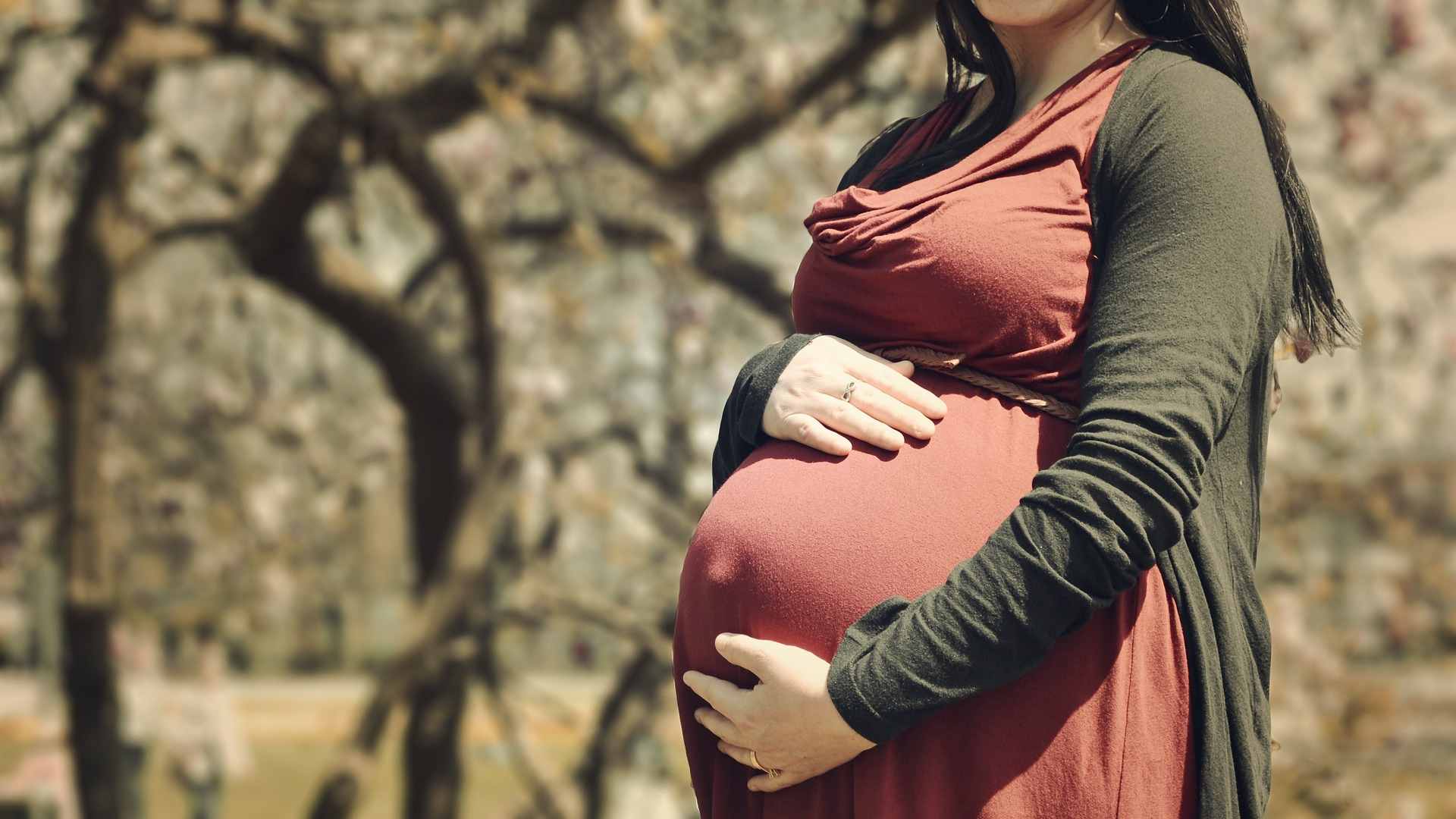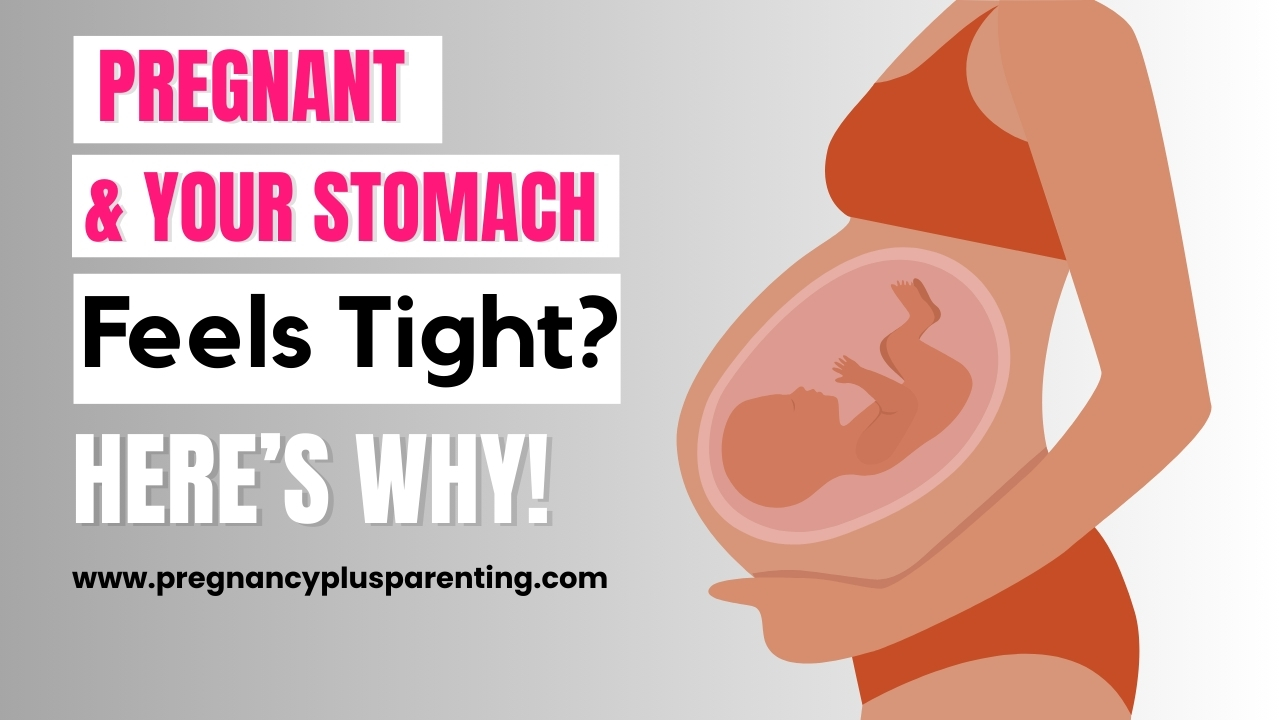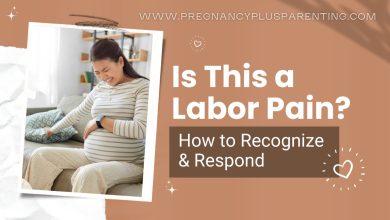Pregnant & Your Stomach Feels Tight? Here’s Why!
A hard belly during pregnancy is common in women. It’s understandable, of course, if you’re pregnant for the first time and you’re not sure if there’s any cause for concern.
But having a hard belly can be a completely normal thing. Whether it’s dangerous or not depends entirely on your pregnancy week.
How does it actually happen? What is a hard stomach? Under what circumstances is it dangerous? How can I treat a hard stomach?
You can find this and much more here.
What is a hard stomach and what does it feel like?
The simplest explanation is that your stomach becomes hard due to contractions of your uterus.
The uterus contracts and your body prepares for birth.
Your belly may sometimes feel hard during pregnancy, but it’s usually not painful. It just feels strange.
A hard stomach is also visible to other people from the outside.
When you touch your baby bump, it feels firm and hard. What you’re feeling is the uterus hardening for a few minutes.
You can get a hard belly at different stages of pregnancy.
So if you notice a hard belly in early pregnancy, you don’t have to worry about it right away.
However, if you experience any pregnancy-related discomfort or feel pressure and pulling in your back area, prolonged hardening, or general pain, you should consult your gynaecologist immediately.

The uterus – an active muscle
It is said that the uterus is always moving, even if the uterine muscles are inactive during pregnancy due to progesterone.
Nevertheless, changes occur throughout pregnancy to which the muscles of the uterus react.
Progesterone is a female sex hormone, also called corpus luteum hormone.
The uterus reveals itself through a hard belly and contractions.
Uterine contractions can have various reasons – to support the baby’s entry into the mother’s pelvis, to uterine exercises in preparation for the upcoming birth, to promoting blood flow to the placenta and uterus.
As the baby grows in the womb, the uterus expands, causing cramps. These cramps lead to a hardened baby bump.
As already mentioned, it is nothing serious, it is completely normal and the most important thing is that it does not harm you or your baby.
Sometimes it can just be an unpleasant feeling.
If you feel unwell, you can always contact your gynecologist.
What causes a hard baby belly and what are the reasons?
A hard stomach during pregnancy is caused by irritation of the uterus.
There can be various reasons for this – stressful everyday life, digestive problems (constipation), less space in the stomach, the feeling of pressure because the baby is growing inside you, stress, contractions (practice contractions and lightening contractions), but also magnesium deficiency.
Whatever the reason, try to relax as much as possible.
I know you hear this a lot, and it might get on your nerves sometimes (especially towards the end of your pregnancy), but it’s the best way to calmly prepare for motherhood .
1. The baby is growing inside you
In the first trimester, you won’t see a belly, or at least not a big change.
You feel different, you know there’s a baby growing inside you, but everything else is the same, or is it?
Nausea, drowsiness, and fatigue! These are things you might experience, or, if you’re lucky, these changes might skip over you.
The good news is that these changes only occur in the first trimester. Unfortunately, some women experience them throughout their entire pregnancy.
However, I hope that this doesn’t happen to you.
For example, I didn’t have any problems with nausea , but it made me feel sleepy all day, especially at work.
In the second trimester, most women can relax as previous problems disappear and can finally enjoy the pregnancy as a whole.
In this trimester you start to notice your tummy.
By the time you reach the third trimester, your baby is growing more and more and it is during this part of the pregnancy that you will experience the most changes: shortness of breath, pelvic floor strain, back pain, sleep disturbances , heartburn, water retention, etc.
Your stomach feels harder and harder.
Uterine contraction is a natural process that prepares your body for birth and cervical dilation.
Always remember, a hard stomach during pregnancy is a completely normal thing.
If your hard stomach is uncomfortable, contact your doctor and get advice.

2. Digestive problems
Constipation can also play a major role. It can lead to cramps and contractions, resulting in a hard stomach.
It is believed that the reason lies in the change in hormone production, which actually relaxes the intestines.
Because the stool moves more slowly, it stays in the intestine longer and the water is removed from it.
If you suffer from persistent constipation, talk to your doctor.
Please do not try to self-medicate, even if you can buy it over the counter.
In addition to medication, you can relieve constipation with home remedies. Try some of these tips:
- get enough exercise, do sports, walk, do yoga , etc.;
- drink enough water – 8 to 10 glasses a day;
- pay attention to your diet : eat wholemeal bread instead of white bread, fiber in the form of fruits (figs, prunes…) and vegetables, dairy products, pulses, etc.;

3. Excessive physical and mental stress
A hard belly during pregnancy can cause a lot of stress. It can be triggered by excessive physical or mental strain.
It is difficult to completely protect yourself from the stress of everyday life, actually almost impossible.
Fortunately, a little stress doesn’t harm your child. On the contrary, it’s a great way to prepare your baby for life.
Of course, too much stress is harmful to both the mother and the child.
But life outside the womb is something your future baby will have to get used to.
There are many things that stress you as an expectant mother, whether it is professional problems, financial worries or problems with your partner.
If you can’t ignore these problems, try talking to someone about them.
You can talk to someone about it, for example your mother, friend, doctor.
Relief is necessary for you in this state; only then will you be able to relax and concentrate on the birth of your child.
Try to take several rest breaks, put your feet up and relax.
If you have a bathtub, prepare a warm bath with lavender oil; this aromatic scent will help you relax better.
Do you like reading books? Choose something light, like “Eat, Pray, and Love.”
Everything you do affects not only you but also your baby.
So try to relax and enjoy the few days or hours you have left before the birth and pay attention to the signals.
4. Practice contractions or Braxton-Hicks contractions
Braxton Hicks contractions are also known as false labor or practice contractions.
These are the first or early contractions of pregnancy, which usually occur from the 20th week of pregnancy.
Some women are aware that the cervix often contracts as early as 25 or 26 weeks, but most women only become aware of it around 29 weeks.
This condition lasts up to a minute, in some cases a little longer.
Your belly feels harder. What you’re feeling is a mild, uncoordinated uterine contraction, which varies from woman to woman.
Individual differences are most pronounced during periods of frequent stress or exertion. These contractions are usually normal and harmless.
Unlike real contractions, they don’t dilate the cervix. Some women may notice Braxton Hicks contractions, while others may not, just as they may experience contractions that occur after birth .
I don’t remember if I had contractions like that.
At the end of my pregnancy, all I wanted was to give birth as soon as possible and hold my baby in my arms.
5. Braxton Hicks contractions (pre-labor contractions) and real contractions
Braxton Hicks contractions or premature labor cause the uterus to contract 2 to 4 weeks before birth, causing the baby to slide deeper into the pelvis, resulting in a hard abdomen.
They can be a bit more painful, and depending on the woman, you may feel a pulling sensation in your back.
Real contractions or labor pains are much more painful.
In addition to the great pain, these contractions are characterized by their intensity; they last longer and occur at regular intervals.
When real labor begins, many women are afraid, especially those who are becoming mothers for the first time.
I had this fear too and it is completely normal to have these feelings.
I can’t tell you it will be easy.
But all moms have something in common: the warm feeling that embraces you as soon as you hold your baby in your arms.
6. Magnesium deficiency
If your stomach feels hard frequently during your pregnancy, it may be due to a magnesium deficiency.
Your body needs extra magnesium because your unborn child needs it now too.
You also need extra magnesium due to the rapid growth of your uterus. A hard stomach may occur more frequently in this case, and you may experience abdominal cramping.
You can either ask your gynecologist about magnesium supplements, or you can find it in foods that contain a lot of minerals: beans, broccoli, bananas, dark chocolate, Emmental cheese, peas, raspberries, oatmeal, pumpkin seeds, sunflower seeds, whole-wheat bread and whole-wheat flour.
How can you differentiate between practice contractions, pre-labor contractions and labor contractions?
Practice contractions, also known as Braxton Hicks contractions, are the first contractions in pregnancy.
These can occur from the 20th week of pregnancy, but for many women it is an individual time.
Braxton Hicks contractions occur very irregularly and are most intense when lying down or sitting. As soon as you stand up or generally move around, they stop hurting.
On the contrary, if you move during real contractions, the pain will be more intense. Sometimes you won’t be able to move at all.
One of the biggest differences is that the cervix does not open during practice contractions like it does during real contractions.
The intensity between contractions also varies. Labor contractions are much more painful and the intervals are more regular.
The purpose of the lightening contractions is to contract the uterus 2 to 4 weeks before birth and allow the baby to slide deeper into the pelvis, thus resulting in a hard abdomen.
They can sometimes be more painful, and depending on the woman, you may feel a pulling sensation in your back.
This may all sound way too complicated for you.
But believe me, all you need to do is feel and listen to your body’s signals and you will know when the time has come, that these are real contractions and that you will soon have a baby.
There is no room for panic, breathe deeply and relax, even if it sounds impossible.
Regular breathing is important during childbirth because it facilitates the entire birth process.

When is a hard stomach dangerous during pregnancy and when is it harmless?
There is no concrete answer to this question because it depends on many factors.
When did the stomach become hard, i.e., at what stage of pregnancy? Does it occur frequently, and if so, how often? Is it accompanied by severe pain?
There are some symptoms that play an important role in this. You should also pay attention to the warning signs. These can include the following:
- if you lose amniotic fluid;
- bleeding occurs;
- you feel severe pain, you are unable to move;
- you constantly have the feeling that the baby is being pushed further and further into the pelvis;
- you have regular contractions that occur more frequently;
As mentioned before, these are warning signs that something is wrong. But generally, a hard belly is a completely normal occurrence, especially in the last trimester.
However, it is not a bad idea to contact your gynecologist if you feel that something is wrong.
When should you see your doctor
As a general rule, whenever you don’t feel well, whenever you think something is wrong, you should see your doctor.
Especially if you have a persistently hard stomach during pregnancy, it is a good reason to see a doctor.
Even if you think it’s harmless, it’s better to discuss any unclear points with him.
You will feel more comfortable knowing that you have asked about some problems, even if they are small ones.
Tips for treating a hard stomach
Here I give you various tips on how to treat a hard stomach and what you can do:
– Enemy number 1 is stress, which you should generally avoid;
– Don’t carry heavy things anymore. Overexertion is forbidden!
– Try various relaxation exercises: for example, lie down on the floor and make yourself comfortable (you can place a pillow under your knees). Breathe deeply into your stomach, consciously relax, and then tense certain parts of your body.
Or another: sit down, relax your arms, breathe deeply, and exhale. Your back remains straight and your shoulders relaxed, while your eyes remain closed the entire time.
– rest, put your feet up and relax;
– do sports, yoga, take a walk or go swimming;
– pay attention to your diet, eat more fiber in the form of fruits and vegetables and drink plenty of water;
– consume more magnesium, either through magnesium supplements or foods that contain enough minerals;
– prepare a warm bath or take a warm shower;
Final thoughts
Dear future mom, maybe your due date is very close and you can hardly wait to meet your baby.
I’ve been very impatient over the past few weeks, wondering when it will finally happen. I can’t wait any longer…
But you’ll see, especially if it’s your first child, time will fly by. So enjoy every minute of your pregnancy.
Attend a birth preparation course , take your time to find the best midwife for you and find out what to expect after the birth .
I hope this article will be helpful to you and that you will try out some of the tips.
I wish you all the best and take care.







